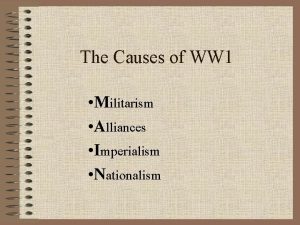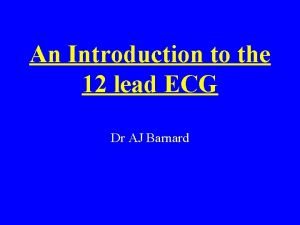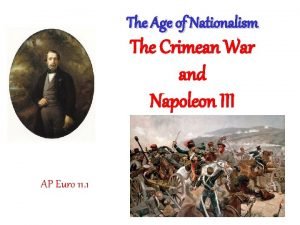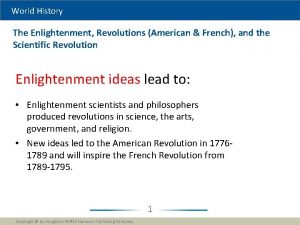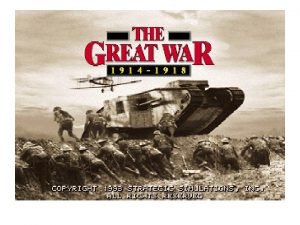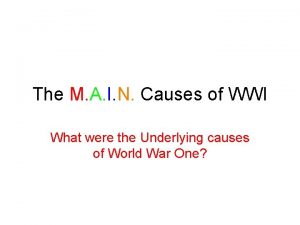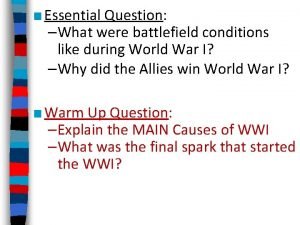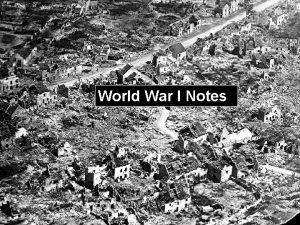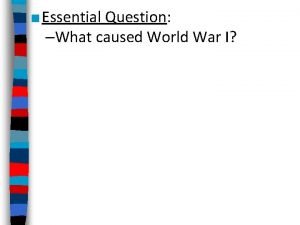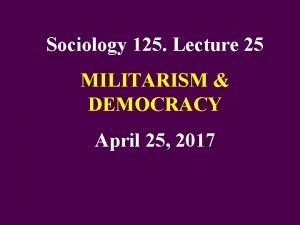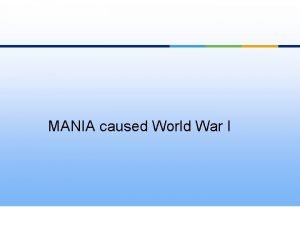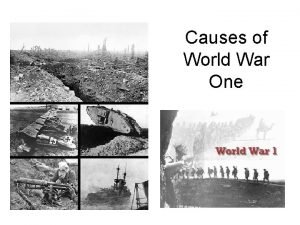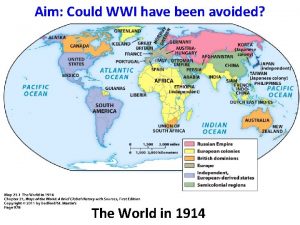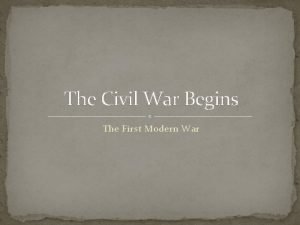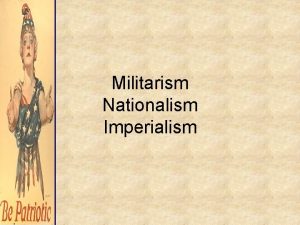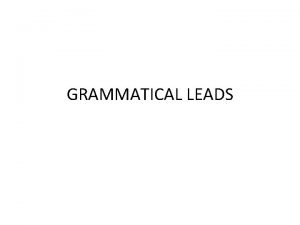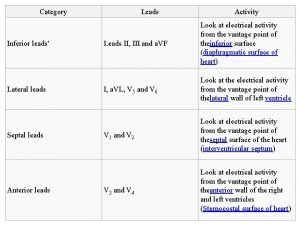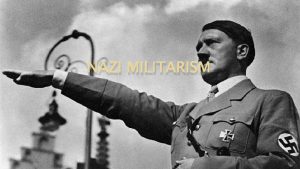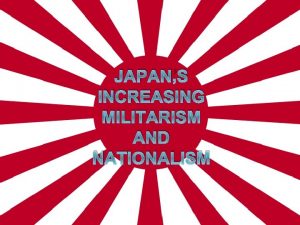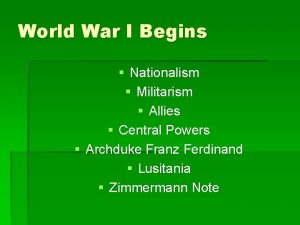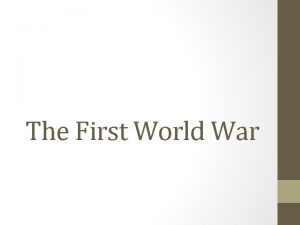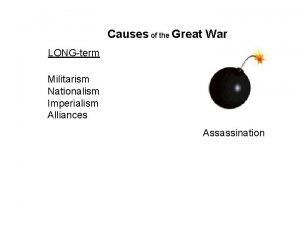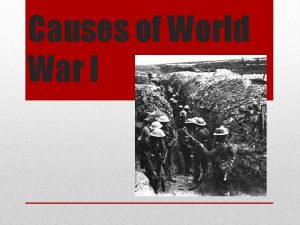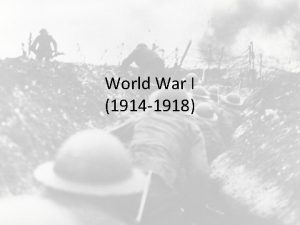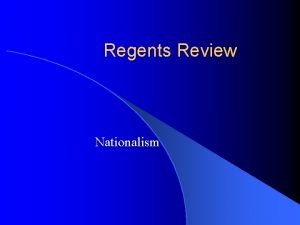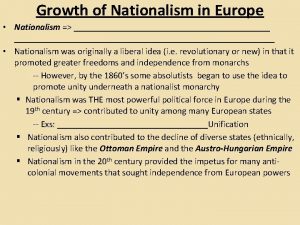Arming For War Nationalism leads to Militarism Concept


















- Slides: 18

Arming For War Nationalism leads to Militarism

Concept Attainment: Militarism The Greatness of War - Heinrich Von Treitschke What must the individual forget for the sake of the state? What fosters war? How is Christianity “perverted” by militarism? According to Treitschke what will God insure? According to this excerpt what is the attitude toward Militarism?

Moving Towards Militarism Nationalism leads to imperialism which in turn leads to Militarism, the policy of glorifying military power and keeping a prepared army for war. Chancellor Otto von Bismarck leads nations to victory against France and stability.

Bismarck forces Pacts 1879 makes pact between Germany and Austria. Hungary. Three years later Italy joins pact forming the Triple Alliance. Makes pact with Russia

Kaiser Wilhelm II replaces Bismarck as leader of Germany. Militaristic, enlarges German Navy. Alarms other nations to forming their own alliances. Great Britain, France, and Russia would form the Triple Entente in opposition to Triple Alliance.

Becomes Powder Keg National uprisings in area create uprisings and ethnic clashes. Serbians try to create their own ethnically majority nations. Austria-Hungary looks at Serbia as new area for

Causes of World War I The Reasons for the Great War

M. A. N. I. A. An acronym for the 5 main causes of WW 1: M: Militarism A: Alliances N: Nationalism I: Imperialism A: Assassination

Militarism A massive buildup of armed forces to deter rivals (i. e. Arms Race) When a nations armed forces come to dominate their national policy An all-around glorification of the military and war itself

Militarism Germany and Britain were competing to expand their dominance of the seas Britain had introduced a battleship called the “Dreadnought”in 1906 Germany followed with their own battleships soon after By 1914 Britain had 29 dreadnoughts to Germanys 17

Militarism Russia, France and Germany also competed to expand their armies 1880 1914 German y 1. 3 m 5. 0 m France 0. 73 m 4. 0 m Russia 0. 40 m 1. 2 m

Alliances Signed treaties in which each nation involved pledges to defend the other if attacked by an aggressor. By 1914 all the major powers were linked by a system of alliances. The alliances made it more likely that a war would start. Once started, the alliances made it more likely to spread as well.

Alliances TRIPLE ENTENTE AKA Allied Powers Great Britain France TRIPLE ALLIANCE AKA Central Powers Germany Austria. Hungary

Nationalism Pride and patriotism in one’s nation/national identity Prior to WW 1, nationalism became aggressive and a major cause of international tension Nations wanted to assert their power and independence In Eastern Europe, Slavic groups wanted independence from Austrian rule, and were aided in this by Serbia and Russia

Imperialis m All of the great powers were competing for colonies/territory After 1870, the European nations began to acquire colonies in Africa, Asia, and the Pacific Colonial rivalries lead to: strained relationships among European powers due to the many clashes between France, Britain, Germany and Italy in

Assassination The “Spark” that started the Great War (WW 1) June 28, 1914 Heir to the Austrian throne, Archduke Franz Ferdinand visits Sarajevo Capital of Bosnia, recently grabbed by Austria Hotbed of Slavic Nationalism

Assassinatio n Members of the terrorist organization “Black Hand” attack the Archduke Gavrilo Princip shoots and kills Archduke Ferdinand his wife Sophie

The Point of No Return Austria blamed Serbia for Ferdinand’s death and for supporting terrorists July 28: Austria declares war on Serbia Germany pledges support for Austria Russia pledges support for Serbia July 30: Russia mobilizes troops to support Serbia August 1: Germany declares war on Russia
 Nationalism imperialism militarism
Nationalism imperialism militarism Imperialism nationalism militarism alliances
Imperialism nationalism militarism alliances Causes of ww2
Causes of ww2 Pathologic q wave criteria
Pathologic q wave criteria Crimean war nationalism
Crimean war nationalism Militarism
Militarism Militarism world history definition
Militarism world history definition Militarism
Militarism Imperiaalism
Imperiaalism Militarism
Militarism Mania causes of ww1
Mania causes of ww1 Mania militarism
Mania militarism Nationalism in europe
Nationalism in europe Militarism definition
Militarism definition Militarism
Militarism Mania in world war 1
Mania in world war 1 Kaiser wilhelm ii deformity
Kaiser wilhelm ii deformity Militarism
Militarism Why was the civil war considered the first modern war
Why was the civil war considered the first modern war

